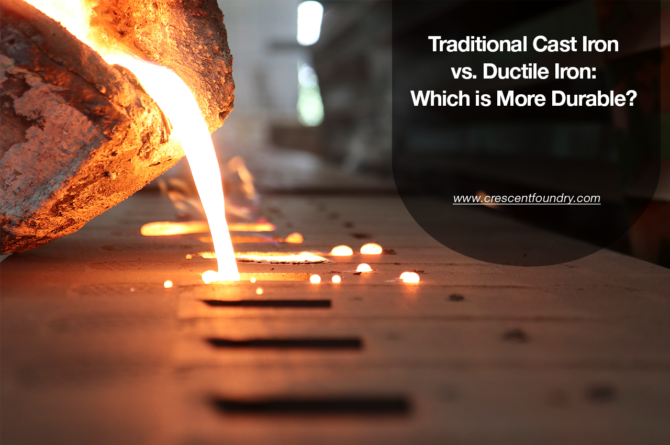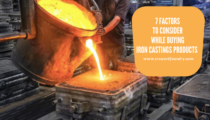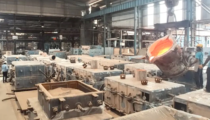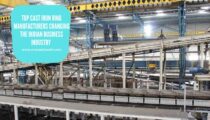Applications of premium-quality iron casting products are rapidly rising every…

Traditional Cast Iron vs. Ductile Iron: Which is More Durable?
Iron is one of the most commonly used materials in the world, and it has been used for centuries in various applications. Cast iron and ductile iron are two iron types commonly used in industrial applications. Both materials have advantages and disadvantages, and choosing between them depends on the specific application. This blog will compare traditional cast iron and ductile iron and determine which is more durable.
For their high-demand processes, clients from a wide range of industries require valves of every kind. Valves are available in a vast array of materials for any conceivable application. PVC, carbon steel, stainless steel, cast iron, and ductile iron are a few of these materials. Cast iron casting manufacturers contribute to sustainable manufacturing practices by optimising resource utilisation and minimising waste.
Fortunately, there aren’t many significant variations between cast iron and ductile iron, making it easy to compare valves manufactured from either type. Following a description of each material’s characteristics, we shall discuss its advantages and disadvantages. You will be an expert on iron by the time this blog article is through!
Cast Iron
Carbon and silicon are added when the iron is melted, resulting in cast iron. Cast iron’s distinctive grey colour results from the graphite particles that make up the material’s carbon content. Cast iron has excellent wear resistance, superior machinability, and affordability. It is often used in things like cookware, pipelines, and engine blocks where strength and longevity are needed.
Cast iron’s hardness, which makes it resistant to surface wear, is one of its key benefits. Its hardness, however, also renders it fragile and prone to fracture when under pressure. Cast iron is also prone to corrosion, which may cause rust and degradation over time.
Keep Reading: Top 5 Industries That Rely On Cast Iron Products Manufacturers
Ductile Iron
Ductile iron is a more modern alloy developed in the mid-20th century. It is made by adding a small amount of magnesium to molten iron, which causes the graphite to form in nodules rather than flakes. This gives the material its characteristic ductility, or ability to bend without breaking. Ductile iron is known for its excellent strength, toughness, and durability. It is commonly used in high-strength and ductility applications, such as pipes, automotive parts, and machinery.
One of the main advantages of ductile iron is its ductility, which makes it less brittle and more resistant to cracking under stress. Ductile iron is also more corrosion-resistant than cast iron, making it a better choice for outdoor applications. However, ductile iron is more expensive than cast iron due to its more complicated chemical makeup.
Keep Reading: How Is Ductile Iron Casting Favouring The Indian Economy?
Comparison
When it comes to durability, ductile iron is generally considered to be more durable than cast iron. Ductile iron is less brittle than cast iron, even before heat treatment. It does not fracture as easily with impact. Being ductile allows the iron to bend. In comparison, cast iron is harder. This hardness means that it manages surface wear well. cast iron is also better at vibration damping. The differences are due to the microstructures of graphite within these iron alloys. Ductile iron has excellent corrosion resistance, tensile strength, and yield strength. Unlike cast iron, ductile iron does not break when bent, which is more suited for high-demand applications. With a strong focus on quality control and efficient manufacturing processes, the best ductile iron products suppliers In India consistently surpass industry standards.
Differences Between Ductile Iron and Cast Iron
Strength
Due to its superiority over cast iron, ductile iron is preferred for industrial purposes. On the other hand, cast iron is more prone to breaking, making it inappropriate for certain purposes. Additionally, cast iron cannot bend without breaking or elongating more than ductile iron without losing its form.
Cost
Due to its strength and durability, ductile iron is more costly than cast iron. Cast iron costs less since it is simpler to make but more costly overall because it needs constant upkeep.
Employer-Side Applications
Due to its strength and longevity, ductile iron is often used in pump casings, valve bodies, big gas and oil pipe applications and major water and sewage lines. Due to its low cost and simple casting process, cast iron is favoured for smaller pipes, guttering pipes and stove/grill plates.
Other Dissimilarities
- The durability of ductile iron is greater.
- Cast iron is more brittle than ductile iron.
- Different forms may be cast out of ductile iron.
- Cast iron is cheaper than ductile iron in price.
Choosing between ductile iron and traditional cast iron
Although ductile iron costs much more than cast iron, it is less costly and difficult to cast than steel. It is often selected according to both its technical merits and price. It is used when ductility and impact resistance is advantageous since it is a less brittle alloy than cast iron. cast iron still outperforms steel for damping, although it performs better than steel at compressive yield and vibration damping.
Bollards designed to withstand impacts often employ ductile iron. Most pipes, particularly those under pressure, are made of this iron alloy. Where the impact is probable, ductile parts may be found in cable casings, pumps, and vehicle parts.
Cast iron is still a significant and popular alloy for uses where the brittleness of standard cast iron is not a concern. It is often used to construct objects that won’t be subjected to impact during normal use. It is also used for hardscape, including tree grating, trench grating, and manhole covers. Its effective vibration dampening makes it an excellent machine base. Additionally, it is the best option for brakes or engine parts that will not be impacted but must handle significant vibration.
Consulting a metallurgist or engineer is crucial before selecting an alloy for any project. They will assess the component’s operating stress and aid in selecting materials that can safely handle the application. Sometimes, choosing between ductile iron and cast iron comes down to price. Other times, the unique characteristics of the alloy are required.



